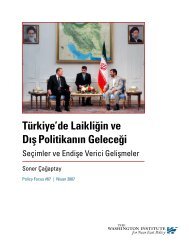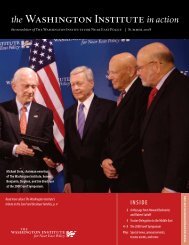Michael Eisenstadt David Pollock How the United States Benefits ...
Michael Eisenstadt David Pollock How the United States Benefits ...
Michael Eisenstadt David Pollock How the United States Benefits ...
Create successful ePaper yourself
Turn your PDF publications into a flip-book with our unique Google optimized e-Paper software.
To deal with <strong>the</strong>se U.S. apprehensions, Israel<br />
halted arms and most military technology transfers<br />
to China in 2000, and a joint mechanism to review<br />
potential Israeli arms and technology transfers to<br />
countries of concern was established in 2003. This<br />
problem, however, was not fully resolved until <strong>the</strong><br />
conclusion of a 2005 agreement that led, inter alia,<br />
to personnel changes at <strong>the</strong> Israeli Ministry of<br />
Defense, <strong>the</strong> passing of Israeli export control legislation,<br />
<strong>the</strong> creation of a Defense Export Control<br />
Directorate in <strong>the</strong> Defense Ministry to oversee<br />
implementation of this legislation, and <strong>the</strong> establishment<br />
of a U.S.-Israel Defense Export Control<br />
Working Group. 73 These steps appear to have<br />
assuaged U.S. concerns, and <strong>the</strong> issue no longer<br />
seems to be a source of bilateral contention.<br />
Israel’s defense industries—working with U.S.<br />
partners—are likely to remain important niche<br />
suppliers of innovative high-tech items and systems<br />
for <strong>the</strong> U.S. military, particularly unmanned<br />
vehicles and robotic systems, battlefield intelligence,<br />
surveillance, and reconnaissance sensors and<br />
platforms, and perhaps rocket defenses, passive and<br />
active defenses for armored vehicles, 74 and minisatellites—<strong>the</strong><br />
last of which may offer a relatively<br />
inexpensive way for <strong>the</strong> U.S. intelligence community<br />
to surge its capabilities during crises. 75<br />
The <strong>United</strong> <strong>States</strong> has derived a number of unanticipated<br />
benefits from its aid to Israel, by directly and<br />
indirectly fostering <strong>the</strong> emergence of one of <strong>the</strong> most<br />
innovative and dynamic defense industries in <strong>the</strong><br />
world. As a result of <strong>the</strong> U.S.-Israel relationship, U.S.<br />
firms are <strong>the</strong> partner of choice for Israeli firms wishing<br />
to market <strong>the</strong>ir products to <strong>the</strong> U.S. military and<br />
its allies. This has enabled U.S. defense contractors to<br />
keep employees on <strong>the</strong> payroll or to create new jobs,<br />
and to preserve or expand <strong>the</strong>ir market share, while<br />
benefiting from Israeli experience and R&D. And <strong>the</strong><br />
<strong>United</strong> <strong>States</strong> and allied militaries gain access to technologies<br />
and systems that enhance <strong>the</strong>ir qualitative<br />
edge and save lives on <strong>the</strong> battlefield; to wit, Israelideveloped<br />
armor, which has been used on thousands<br />
of U.S. armored vehicles in Iraq and Afghanistan, has<br />
probably saved thousands of American lives. 76<br />
<strong>How</strong> <strong>the</strong> <strong>United</strong> <strong>States</strong> <strong>Benefits</strong> from Its Alliance with Israel<br />
Homeland Security<br />
Following <strong>the</strong> attacks of 9/11, homeland security<br />
became a top U.S. priority. In <strong>the</strong> decade since<br />
<strong>the</strong>n, U.S.-Israel cooperation in this area has<br />
expanded dramatically. The prior existence in Israel<br />
of a robust homeland security services and technology<br />
sector—created years before in response to<br />
domestic needs—and <strong>the</strong> dramatic growth in U.S.<br />
and global demand for homeland security solutions<br />
since 9/11 helped catalyze Israel’s emergence as a<br />
U.S. partner and global homeland security capital. 77<br />
U.S. law enforcement, emergency management,<br />
and homeland security agencies on <strong>the</strong><br />
federal, state, and local levels enjoy close working<br />
relationships with <strong>the</strong>ir Israeli counterparts. U.S.<br />
government agencies involved include <strong>the</strong> Department<br />
of Homeland Security, Federal Bureau of<br />
Investigation, Bureau of Alcohol, Tobacco, Firearms,<br />
and Explosives (ATF), Secret Service, U.S.<br />
Marshals Service, Federal Emergency Management<br />
Agency (FEMA), U.S. Nor<strong>the</strong>rn Command,<br />
Army National Guard, and various state and local<br />
law enforcement authorities, while Israeli government<br />
organizations include <strong>the</strong> Ministry of Public<br />
Security, IDF Home Front Command, Israel<br />
Police, and Ministry of Foreign Affairs. Areas<br />
of cooperation include counterterrorism; critical<br />
infrastructure protection; emergency planning,<br />
response, and consequence management; aviation<br />
security; cybersecurity; chemical, biological, and<br />
radiological/nuclear security; and joint R&D in a<br />
number of areas, including explosives-detection<br />
technology and techniques. 78 Moreover, observers<br />
from <strong>the</strong> <strong>United</strong> <strong>States</strong> and Israel regularly attend<br />
civil defense/homeland security exercises held in<br />
each country. 79<br />
U.S. law enforcement, emergency services, and<br />
civil aviation authorities have accrued numerous<br />
lessons learned from <strong>the</strong>ir Israeli counterparts. 80<br />
And various federal and local government agencies<br />
have acquired Israeli homeland security technologies<br />
to help secure border crossings, critical infrastructure,<br />
and air- and seaports.<br />
The WashingTon insTiTuTe for near easT Policy 19













